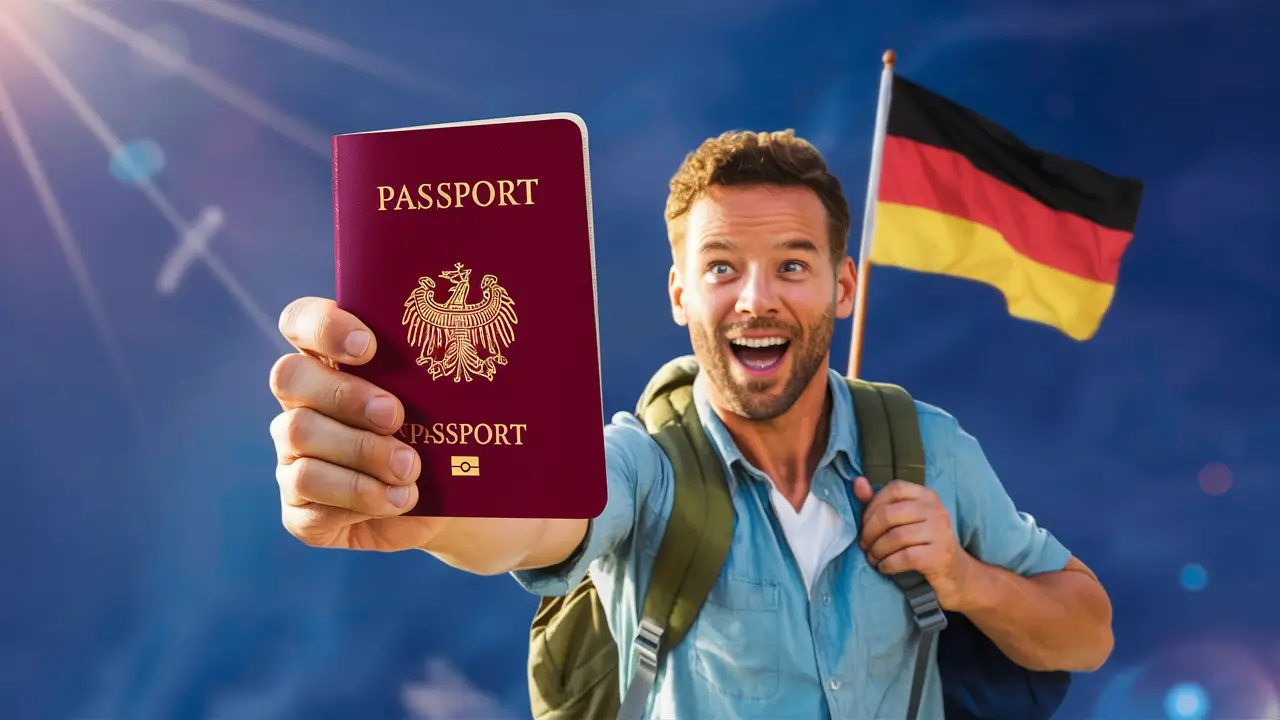In today’s interconnected world, digital nomads represent a growing demographic of location-independent professionals who leverage technology to work remotely while traveling globally. Germany, with its robust economy, excellent infrastructure, and high quality of life, has emerged as an attractive destination for these modern wanderers. But beyond temporary stays, many digital nomads wonder about establishing deeper roots in Deutschland through citizenship.
The pathway to German citizenship for digital nomads involves navigating specific legal requirements, understanding residence obligations, and demonstrating genuine integration into German society. While the concept of constantly moving across borders might seem at odds with citizenship requirements, Germany’s modernizing approach to immigration presents intriguing possibilities.
Does the German immigration system accommodate the unique lifestyle of digital nomads? How can remote workers meet the residence requirements for naturalization? Is dual citizenship an option? What strategies can digital nomads employ to transition from temporary visitors to permanent citizens?
What Makes Someone a Digital Nomad in Germany’s Legal Context?
Before diving into citizenship pathways, it’s crucial to understand how Germany’s legal system views digital nomads. Unlike some countries with specific digital nomad visas, Germany doesn’t have a dedicated visa category for location-independent workers.
In German immigration law, digital nomads typically enter under one of these categories:
- Freelancer visa (Freiberufler)
- Self-employed visa (Selbständiger)
- Employee visa if working remotely for a German company
- Jobseeker visa as a transition option
Digital nomads differ from traditional immigrants because their work often doesn’t tie them to a specific location within Germany. This creates unique challenges when addressing the residency requirements for citizenship.
“When I first came to Germany as a digital nomad from Canada, I entered on a freelancer visa. The immigration officer was confused about my business model of serving clients worldwide while living in Berlin. I had to clearly demonstrate that although my clients were international, my tax home and life center would be in Germany.” – Maya, UX designer from Toronto
What Are the Basic Requirements for German Citizenship?
German citizenship through naturalization requires meeting several key criteria:
- Legal residence in Germany for at least 8 years (reduced to 7 years with successful integration courses, and potentially 6 years in special cases)
- Valid residence permit
- Financial self-sufficiency without relying on social benefits
- Sufficient German language skills (B1 level)
- Passing the naturalization test about German legal and social systems
- Clean criminal record
- Commitment to the free democratic basic order of Germany
- Renunciation of previous citizenship (with exceptions)
For digital nomads, the most challenging aspects typically involve:
- Documenting continuous residence despite a mobile lifestyle
- Demonstrating sufficient ties to Germany
- Proving stable income from remote work
How Does the Residence Requirement Apply to Mobile Workers?
The residence requirement is often the biggest hurdle for digital nomads. German immigration law expects:
- Physical presence in Germany for the majority of the qualifying period
- Registration of a primary residence (Anmeldung)
- No absences exceeding 6 consecutive months (which would break continuity)
- Total absences not exceeding specific limits during the qualifying period
For digital nomads who frequently travel, carefully documenting all entries and exits becomes essential. The law allows for some flexibility:
| Absence Type | Maximum Duration | Effect on Citizenship Application |
|---|---|---|
| Regular travel | Up to 6 months | No negative impact if primary residence remains in Germany |
| Extended absence | 6-12 months | May be acceptable with prior approval from immigration authorities |
| Multiple shorter absences | Varies | Evaluated cumulatively; should not exceed 6 months per year |
| Work-related travel | Varies | More likely to be accepted with documentation |
| Personal travel | Varies | May face greater scrutiny |
German authorities evaluate the “center of life” concept (Lebensmittelpunkt). Digital nomads must demonstrate that despite travel, Germany remains their primary home base through:
- Maintaining a permanent address
- German health insurance
- German tax residency
- Social ties (memberships, community involvement)
- German bank accounts and financial presence
Can Remote Income Satisfy the Financial Requirements?
German citizenship requires proving financial stability without relying on social benefits. For digital nomads, this means demonstrating:
- Consistent income from remote work
- Proper tax compliance in Germany
- Health insurance coverage
- Retirement planning provisions
Remote workers must register as either:
- Freelancers (Freiberufler) for independent professional services
- Self-employed business owners (Gewerbetreibende) for commercial activities
- Employees of foreign companies with proper tax arrangements
German tax authorities expect digital nomads to pay taxes in Germany if they reside there, regardless of where their clients or employers are based. Tax compliance forms a crucial part of citizenship applications.
“The tax office in Frankfurt initially questioned my application since all my clients were American companies. I had to provide extensive documentation showing I performed all work while physically in Germany, maintained my home office here, and properly reported all worldwide income on my German tax returns.” – James, software developer from Boston
How Can Digital Nomads Demonstrate Integration?
Integration requirements represent another significant consideration. German authorities look for:
- Language proficiency (minimum B1 level)
- Understanding of the German legal and social system
- Community involvement
- Cultural adaptation
Digital nomads can demonstrate integration through:
- Completing integration courses
- Participating in local community organizations
- Developing social networks in Germany
- Learning about German history and culture
- Engaging with local institutions
For citizenship applicants, the naturalization test covers German history, culture, and political system. The test consists of 33 questions, and applicants must correctly answer at least 17 to pass.
Is Dual Citizenship Possible for Digital Nomads?
Traditionally, Germany has required citizenship applicants to renounce their original nationality. However, exceptions exist and are expanding:
- EU citizens can typically maintain dual citizenship
- Countries that don’t allow renunciation (e.g., Argentina, Morocco)
- Cases where renunciation would cause significant hardship
- Recognized refugees
In a significant development, Germany’s coalition government has announced plans to broadly permit dual citizenship through immigration law reforms. This change, expected to take effect in 2023-2024, would remove a major obstacle for digital nomads considering German citizenship.
More information about the planned dual citizenship reforms can be found on the German Federal Government’s official website.
What Visa Pathways Best Support the Transition to Citizenship?
For digital nomads planning a path to German citizenship, starting with the right visa is crucial:
Freelancer Visa (Freiberufler)
This visa suits digital nomads working as independent professionals in recognized fields (writers, programmers, consultants, designers, etc.). Requirements include:
- Viable business plan
- Proof of financial sustainability
- Letters of intent from potential German clients
- Relevant qualifications
- Appropriate health insurance
The freelancer visa typically begins with a 2-3 year period and can be extended, counting toward the residence requirement for citizenship.
Self-Employment Visa (Selbständiger)
For digital nomads running businesses beyond freelance professional services:
- Comprehensive business plan
- Proof of investment capacity
- Evidence of economic interest for Germany
- Relevant experience and qualifications
- Health insurance coverage
This visa follows a similar timeline to the freelancer visa regarding citizenship qualification.
Blue Card for High-Skilled Workers
Digital nomads employed by German companies or working remotely for German employers with salaries above the threshold (currently €58,400 annually, or €45,552 in shortage occupations) may qualify for the EU Blue Card, offering accelerated paths to permanent residence and citizenship.
The BAMF website provides detailed information about Blue Card requirements and benefits.
What Practical Steps Should Digital Nomads Take Toward Citizenship?
Digital nomads serious about German citizenship should:
Establish proper residence
- Register address with local authorities (Anmeldung)
- Minimize lengthy absences
- Document all travel carefully
Ensure legal status
- Maintain appropriate visa/residence permit
- Apply for extensions well before expiration
- Consider transitioning to permanent residence (Niederlassungserlaubnis) after 5 years
Demonstrate financial stability
- Register properly as freelancer/self-employed
- File accurate tax returns
- Maintain adequate health insurance
- Consider voluntary contributions to German pension system
Invest in integration
- Take language courses beyond minimum requirements
- Engage in community activities
- Develop social and professional networks in Germany
Consult with experts
- Immigration attorneys specializing in digital nomad cases
- Tax advisors experienced with international income
- Integration consultants
Navigating the Digital Future of German Citizenship
The digital nomad lifestyle and German citizenship aren’t inherently incompatible, though reconciling the mobile nature of remote work with residency requirements demands careful planning. Germany’s increasing openness to skilled professionals and digital transformation suggests improving conditions for location-independent workers seeking citizenship.
For digital nomads, the journey to German citizenship requires intention and adaptation. While maintaining global connections, establishing Germany as your genuine center of life becomes essential. This means creating meaningful ties to German communities, contributing to the local economy, and embracing German culture alongside your international identity.
With thoughtful documentation, proper legal compliance, and genuine integration efforts, digital nomads can successfully transition from global wanderers to German citizens—all while maintaining the freedom and flexibility that defines the digital nomad experience.
Frequently Asked Questions
Can I apply for German citizenship if I travel frequently for work?
Yes, but you must maintain Germany as your primary residence and carefully document all travel. Absences exceeding six consecutive months may disrupt your citizenship eligibility. Consider informing immigration authorities about extended work trips.
Do I need to speak German to become a citizen?
Yes, German language proficiency at level B1 (intermediate) is required for citizenship. This includes speaking, listening, reading, and writing skills sufficient for everyday communication.
Can I maintain my original citizenship when becoming German?
Currently, most non-EU citizens must renounce their original citizenship when obtaining German nationality, with certain exceptions. However, Germany is implementing reforms to broadly allow dual citizenship, expected to take effect in 2023-2024.
How does working for foreign clients affect my citizenship application?
Working for foreign clients doesn’t negatively impact citizenship eligibility provided you properly register your status in Germany, pay German taxes on worldwide income, and maintain appropriate health insurance.
Can time on a student visa count toward the residency requirement for citizenship?
Yes, time spent in Germany on a student visa typically counts fully or partially toward the residency requirement for citizenship, depending on the specific circumstances and type of study program.




